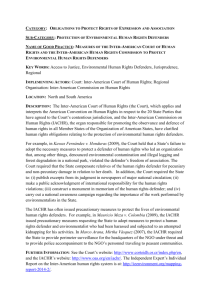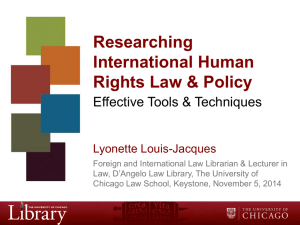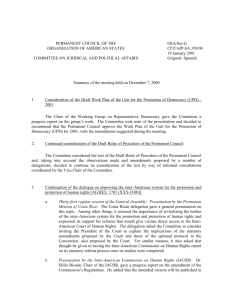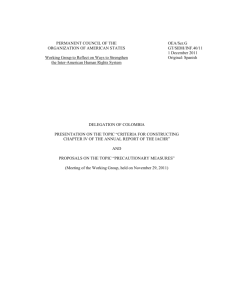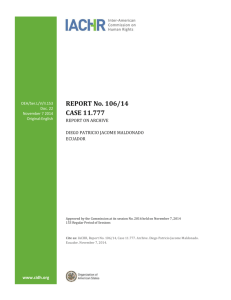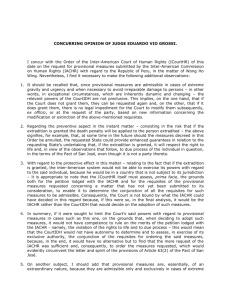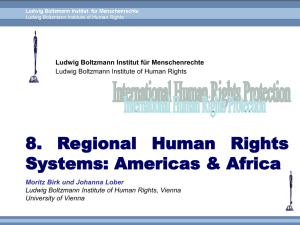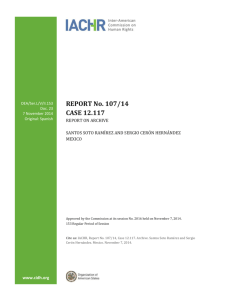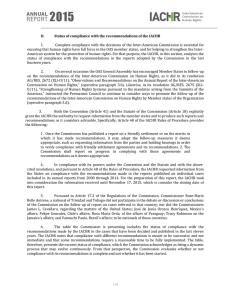Inter- American Commission on Human Rights
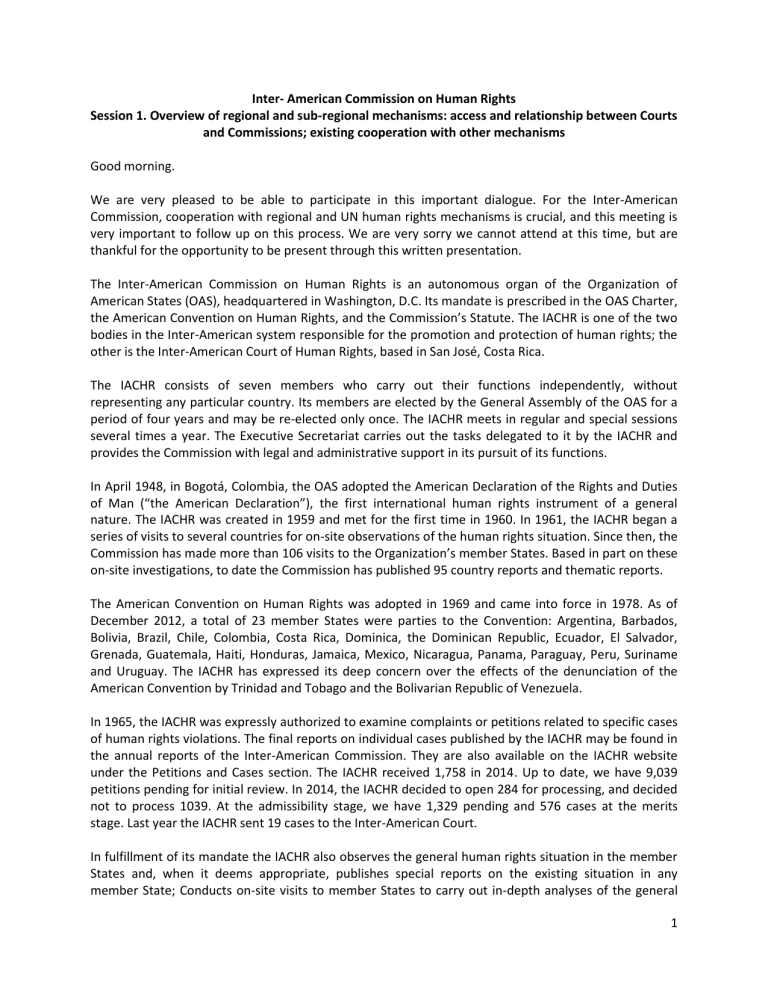
Inter- American Commission on Human Rights
Session 1. Overview of regional and sub-regional mechanisms: access and relationship between Courts and Commissions; existing cooperation with other mechanisms
Good morning.
We are very pleased to be able to participate in this important dialogue. For the Inter-American
Commission, cooperation with regional and UN human rights mechanisms is crucial, and this meeting is very important to follow up on this process. We are very sorry we cannot attend at this time, but are thankful for the opportunity to be present through this written presentation.
The Inter-American Commission on Human Rights is an autonomous organ of the Organization of
American States (OAS), headquartered in Washington, D.C. Its mandate is prescribed in the OAS Charter, the American Convention on Human Rights, and the Commission’s Statute. The IACHR is one of the two bodies in the Inter-American system responsible for the promotion and protection of human rights; the other is the Inter-American Court of Human Rights, based in San José, Costa Rica.
The IACHR consists of seven members who carry out their functions independently, without representing any particular country. Its members are elected by the General Assembly of the OAS for a period of four years and may be re-elected only once. The IACHR meets in regular and special sessions several times a year. The Executive Secretariat carries out the tasks delegated to it by the IACHR and provides the Commission with legal and administrative support in its pursuit of its functions.
In April 1948, in Bogotá, Colombia, the OAS adopted the American Declaration of the Rights and Duties of Man (“the American Declaration”), the first international human rights instrument of a general nature. The IACHR was created in 1959 and met for the first time in 1960. In 1961, the IACHR began a series of visits to several countries for on-site observations of the human rights situation. Since then, the
Commission has made more than 106 visits to the Organization’s member States. Based in part on these on-site investigations, to date the Commission has published 95 country reports and thematic reports.
The American Convention on Human Rights was adopted in 1969 and came into force in 1978. As of
December 2012, a total of 23 member States were parties to the Convention: Argentina, Barbados,
Bolivia, Brazil, Chile, Colombia, Costa Rica, Dominica, the Dominican Republic, Ecuador, El Salvador,
Grenada, Guatemala, Haiti, Honduras, Jamaica, Mexico, Nicaragua, Panama, Paraguay, Peru, Suriname and Uruguay. The IACHR has expressed its deep concern over the effects of the denunciation of the
American Convention by Trinidad and Tobago and the Bolivarian Republic of Venezuela.
In 1965, the IACHR was expressly authorized to examine complaints or petitions related to specific cases of human rights violations. The final reports on individual cases published by the IACHR may be found in the annual reports of the Inter-American Commission. They are also available on the IACHR website under the Petitions and Cases section. The IACHR received 1,758 in 2014. Up to date, we have 9,039 petitions pending for initial review. In 2014, the IACHR decided to open 284 for processing, and decided not to process 1039. At the admissibility stage, we have 1,329 pending and 576 cases at the merits stage. Last year the IACHR sent 19 cases to the Inter-American Court.
In fulfillment of its mandate the IACHR also observes the general human rights situation in the member
States and, when it deems appropriate, publishes special reports on the existing situation in any member State; Conducts on-site visits to member States to carry out in-depth analyses of the general
1
situation and/or to investigate a specific situation. In general, these visits lead to the preparation of a report on the human rights situation encountered, which is then published and submitted to the OAS
Permanent Council and General Assembly; Fosters public awareness of human rights in the Americas. To that end, the Commission prepares and publishes studies on specific subjects, such as measures that should be adopted to guarantee greater access to justice; the impact of internal armed conflicts on certain groups of citizens; the human rights situation of children, women, LGBTI persons, migrant workers and their families, people deprived of their liberty, human rights defenders, indigenous peoples, and communities of African descent, racial discrimination, freedom of expression and economic, social and cultural rights; Organizes and carries out visits, conferences, seminars, and meetings with representatives from governments, academic institutions, nongovernmental organizations, and other bodies, to disseminate information and promote a broader understanding of the work of the Inter-
American human rights system; Makes recommendations to OAS member States for the adoption of measures that will contribute to the protection of human rights in the countries of the Hemisphere;
Requests that member States adopt “precautionary measures” in accordance with the provisions of
Article 25 of its Rules of Procedure, to prevent irreparable harm to human rights in grave and urgent cases. Also, pursuant to Article 76 of its Rules, it can also request that the Inter-American Court order the adoption of “provisional measures” in cases of extreme gravity and urgency to prevent irreparable harm to persons; Submits cases to the Inter-American Court of Human Rights and appears in court during litigation; Requests advisory opinions from the Inter-American Court in accordance with the provisions of Article 64 of the American Convention.
The Commission received 504 requests for precautionary measures last year, and granted 33.
The Commission holds three regular periods of sessions each year, in March, July and October. During the March and October Sessions the Commission holds public hearings. The Commission is holding its public hearings this week, right at this time. They are broadcasted live, and are a very important mechanism to present and discuss the human rights situation in the Americas. In this 156 th Period of
Sessions, the IACHR is holding 57 public hearings.
The Inter-American Commission has continued to work very closely with various United Nations mechanisms in the context of its mandate, giving priority to synergies among human rights mandates. In this connection, 2014 was distinguished by the signature of a Joint Declaration of cooperation between the IACHR and the United Nations High Commissioner for Human Rights, Zeid Ra'ad Al Hussein, during the High Commissioner’s visit to IACHR headquarters on November 19. The Declaration reaffirms joint work streams as well as information-sharing, joint follow-up on recommendations, and joint thematic cooperation. It formalizes practices developed over many years, including joint statements or press releases, periodic meetings, sharing of information on ongoing activities, and cooperation on the preparation of technical reports. These practices were also previously formalized in the recommendations arising out of a workshop on areas for cooperation between the United Nations and regional organizations.
Collaboration between the IACHR and the various United Nations bodies includes close coordination, sharing of experiences and standards, and joint planning. Important instances of such informationsharing have occurred in the preparations for visits by the IACHR and its rapporteurs to various countries in the region and the support provided by various United Nations field organizations for IACHR activities during these visits. For example, information provided by the Subcommittee on Prevention of Torture from its 2012 visit to Paraguay was very helpful for the IACHR Country Rapporteur during his visit there
2
in August 2014. Similarly, the support of the UNICEF country office in Mexico was indispensable to the
Rapporteur on the Rights of the Child during her October 2014 visit to that country.
The Commission has also continued to work very closely with other regional human rights mechanisms.
In this regard, we received a visit from the Arab Human Rights Committee. The visit included 6
Commissioners, and we had a week of very rich and interesting exchanges and dialogue.
An important mandate of the IACHR has been to forge closer ties with the African Commission on human and peoples rights. In this regard, the Commission received a visit from its working group on indigenous peoples last year and was able to exchange jurisprudence, practices and experiences.
Especially with regard to different issues faced by both mechanisms related to the right to collective property of land of indigenous peoples. A few weeks ago, the Secretariat of the Commission received a visit from the Secretariat of the African Commission. We had a very interesting dialogue in relation to several issues such as the use of technology, of media, and in particular, identifying common issues and strategies. In addition, the President of the Commission with two other Commissioners is visiting the
African Commission on its upcoming session, to discuss issues related to LGBTI persons.
The IACHR is very interested in continuing this important dialogue among UN and regional mechanisms and wishes to convey its compromise to continue strengthening this cooperation process.
Thank you.
Marisol Blanchard, Attorney, Coordinator of Inter-Institutional Relations.
3
